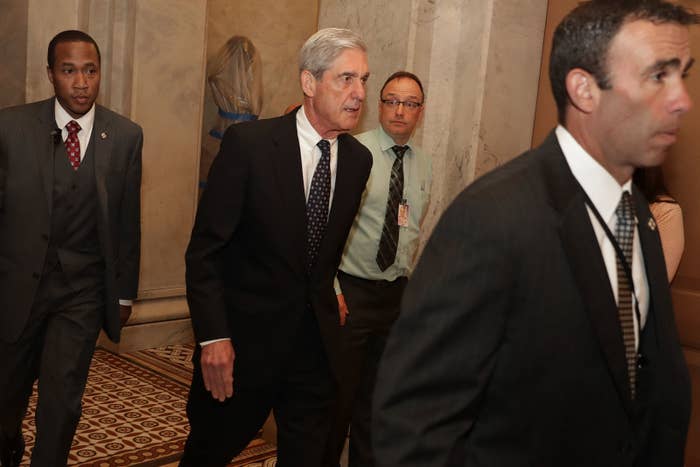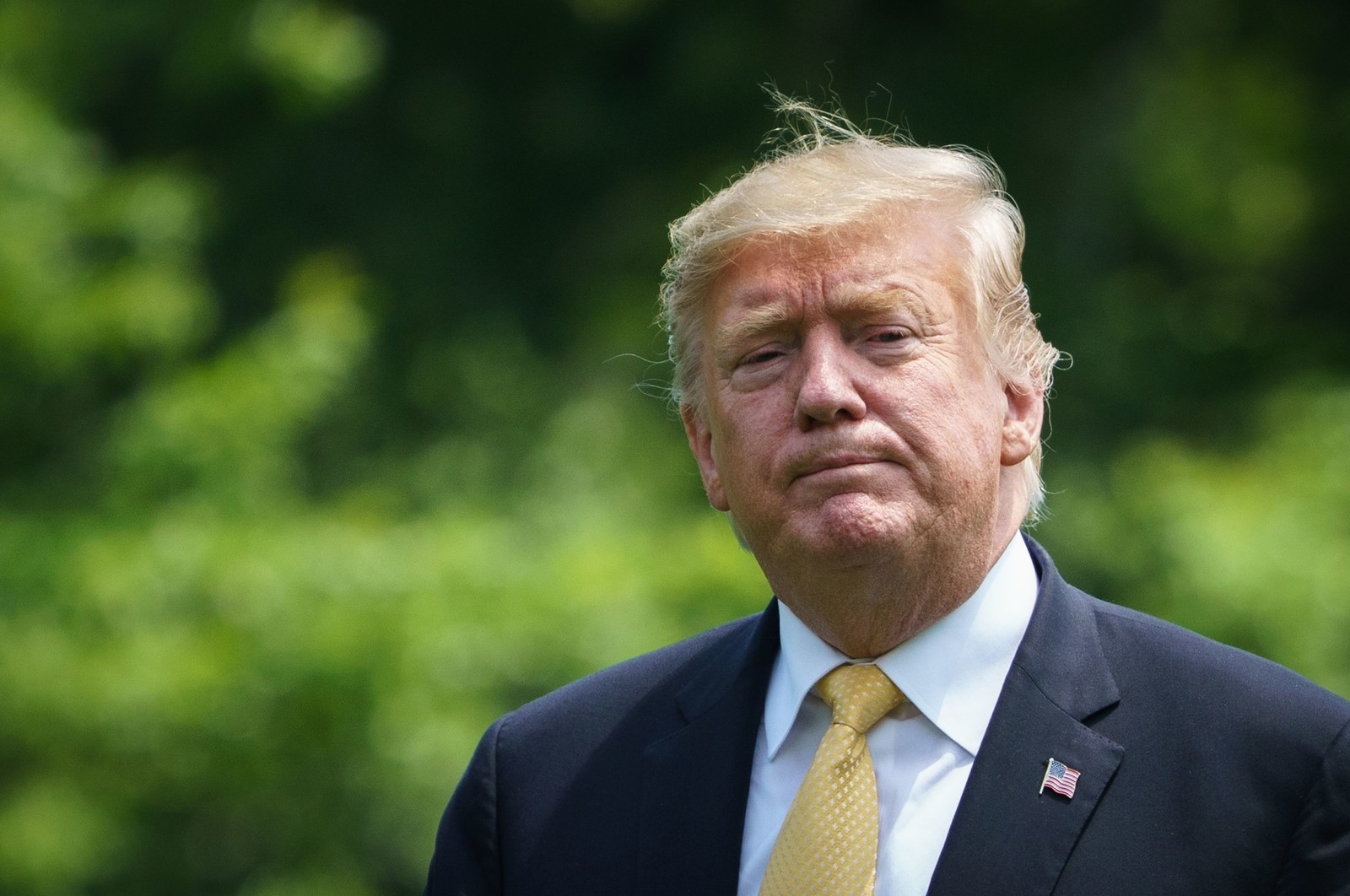
WASHINGTON — Robert Mueller III, the special counsel leading the Justice Department’s investigation into Russian interference in the 2016 presidential election, announced Wednesday that he’s done, and he’s leaving.
In his parting remarks, he reiterated that his office did not clear President Donald Trump of wrongdoing. Mueller’s office explored whether the president had committed obstruction during the investigation, but declined to reach a conclusion. He instead merely presented the evidence on both sides at the time, earning himself criticism from Democrats and confusion from Attorney General Bill Barr, who said he had expected the special counsel to make a decision one way or another.
“If we had had confidence that the president clearly did not commit a crime, we would have said so,” Mueller said Wednesday, using similar language to what he wrote in his final report. “We did not, however, make a determination as to whether the president did commit a crime.”
A former director of the FBI under presidents George W. Bush and Barack Obama, Mueller was appointed as special counsel in May 2017 by then-deputy attorney general Rod Rosenstein — putting him on a collision course with Trump. After nearly two years of rampant speculation that any day could be the one when the president tried to remove him, Mueller submitted his final report and ended his investigation, in the end avoiding a dramatic showdown with the White House.
“I am speaking out today because our investigation is complete. The attorney general has made the report on our investigation largely public,” Mueller said. “We are formally closing the special counsel’s office and as well, I’m resigning from the Department of Justice to return to private life.”
Mueller’s announcement at the Justice Department on Wednesday was his first public statement since accepting the role of special counsel. He did not take questions from reporters after.
In his 400-plus page report, Mueller found there was no evidence that Trump’s campaign conspired with the Russian government during the election, a conclusion that Trump and his supporters have touted as a complete victory. However, Mueller stressed on Wednesday that his team did pursue charges that alleged “multiple, systematic efforts to interfere in our election” by Russian nationals.
As for whether the president committed obstruction during the investigation, Mueller declined to make a “prosecutorial judgment” in his report. If the evidence had supported exonerating Trump, Mueller wrote that his office would have done so, but they could not — he wrote that they found “substantial evidence” Trump committed potentially obstructive acts. “While this report does not conclude that the President committed a crime, it also does not exonerate him,” Mueller wrote at the time.
Barr stepped in instead, and announced that based on his review of the evidence Mueller’s office compiled, it did not support finding that Trump had committed a crime.
In explaining his decision Wednesday, Mueller cited a “long-standing” Justice Department policy that a sitting president cannot be criminally charged.
“Charging the president with a crime was therefore not an option we could consider,” Mueller said. “And beyond department policy, we were guided by principles of fairness. It would be unfair to potentially accuse somebody of a crime when there can be no court resolution of an actual charge.”
Following Mueller’s remarks Wednesday, Trump tweeted that “nothing” had changed and “the case is closed!”
Nothing changes from the Mueller Report. There was insufficient evidence and therefore, in our Country, a person is innocent. The case is closed! Thank you.
But House Judiciary Committee chair Jerry Nadler suggested that Congress will now take up the case. “Given that Special Counsel Mueller was unable to pursue criminal charges against the President, it falls to Congress to respond to the crimes, lies and other wrongdoing of President Trump — and we will do so,” Nadler said in a statement. “No one, not even the President of the United States, is above the law.”
Rep. Justin Amash, the only Republican in Congress to say Trump committed “impeachable” acts, tweeted Wednesday, “the ball is in our court, Congress.”
Mueller also said Wednesday he expected he would not speak further about his investigation, including before Congress, even as Democrats have pushed for him to testify. “So beyond what I’ve said here today and what is contained in our written work, I do not believe it is appropriate for me to speak further about the investigation or to comment on the actions of the Justice Department or Congress,” Mueller said.
Democrats have repeatedly asked Mueller to testify about his conclusions and Nadler has threatened to subpoena him if he declines. Nadler did not address a potential subpoena or Mueller’s remarks about testifying in his statement Wednesday. Democrats and the Justice Department had been engaged in talks about how that testimony might take place, whether in public or in a private sit-down, with Mueller’s team raising concerns about the special counsel appearing political.
Mueller did not address allegations contained in author Michael Wolff’s forthcoming book that reignited the long-simmering fight over obstruction and the special counsel’s intentions this week. According to reviews and excerpts of the book published this week, Wolff alleges that Mueller had prepared a three-count indictment against Trump on obstruction. Mueller kept the alleged indictment on his desk for a year, Wolff wrote, before ultimately abandoning it. Wolff said he had documents supporting his claim, given to him by sources close to the special counsel’s office, but Mueller spokesperson Peter Carr denied Wolff’s account this week, saying “the documents described do not exist.”
The revelations from Wolff’s book, Siege: Trump Under Fire, were first published Tuesday by the Guardian, which said it had also reviewed “the documents concerned.” The alleged draft indictment included charges of “corruptly” seeking to obstruct or influence the Russia investigation, witness tampering, and retaliating against a witness, victim, or informant, the paper reported.
Although Trump lauded the special counsel’s final report, Mueller’s appointment angered Trump from the start. The president repeatedly called the probe a “witch hunt,” even as his lawyers and White House officials said that they were cooperating with the special counsel’s office.
Trump publicly and privately fumed. The New York Times reported Trump ordered then-White House counsel Don McGahn to have Mueller fired in June 2017, after the president identified what he believed were conflicts of interest that disqualified Mueller from the position. Trump reportedly backed down after McGahn, who disagreed with Trump’s assessment, threatened to resign. Trump dismissed the report as “fake news.”
In April 2018, after federal agents executed search warrants against Trump’s longtime lawyer Michael Cohen, Trump railed against the special counsel’s investigation in remarks to reporters at the White House. The warrants came in part out of information that Mueller referred to federal prosecutors in Manhattan, according to Cohen’s lawyer, but Trump appeared to blame Mueller directly.
Asked why he didn’t just fire Mueller, Trump replied, “Well, I think it’s a disgrace what’s going on. We’ll see what happens. But I think it’s really a sad situation when you look at what happened. And many people have said, ‘You should fire him.’”

The special counsel’s office pressed criminal charges against five people with ties to Trump’s campaign and his inner circle: former campaign chair Paul Manafort, Manafort’s deputy and longtime associate Rick Gates, Trump’s short-lived national security adviser Michael Flynn, former campaign foreign policy adviser George Papadopoulos, Trump’s former personal lawyer Michael Cohen, and Trump’s longtime ally and informal adviser Roger Stone. Stone is fighting charges that he lied to Congress; the other four men took guilty pleas.
Manafort and Gates faced charges unrelated to Trump’s campaign, but Flynn and Papadopoulos were charged with lying to the FBI about their Russia contacts — Flynn during the postelection transition and Papadopoulos during the campaign. The indictment against Stone alleged that he was involved with orchestrating communications with WikiLeaks founder Julian Assange during the time that WikiLeaks was receiving and releasing information hacked from the DNC and Hillary Clinton’s campaign.
The special counsel’s office also brought charges against Alex van der Zwaan, a lawyer with ties to Manafort and Gates, as well as a Russian troll farm accused of attempting to interfere in the 2016 presidential election.
A decorated Marine Corps veteran and former high-ranking Justice Department official, Mueller served as director of the FBI from 2001 to 2013, crossing Republican and Democratic administrations. He was working at a Washington, DC, law firm when Rosenstein tapped him on May 17 to lead the Russia investigation. Former Justice Department officials who had served under presidents of both parties praised the pick at the time, as did Democrats and Republicans in Congress — even those who opposed a special counsel investigation.
But there were early rumblings of discontent at the White House. Although Trump released a statement on May 17 saying that he looked “forward to this matter concluding quickly,” the next morning he tweeted, “This is the single greatest witch hunt of a politician in American history!”
In the months that followed, Trump’s allies questioned not only the need for a special counsel, but also the impartiality of Mueller — who had long-standing ties to James Comey, his successor as FBI director — and the lawyers he brought on to the special counsel team. News reports highlighted campaign donations to Democratic candidates made by some special counsel lawyers, fueling charges of bias from Trump and his supporters. Mueller is a Republican.
On June 12, Christopher Ruddy, the CEO of Newsmax Media and a friend of Trump’s, said during an interview on PBS NewsHour that Trump was “considering perhaps terminating the special counsel.”
Under federal regulations, only the attorney general has the power to hire and fire a special counsel. With Jeff Sessions recused from any investigations related to the 2016 presidential campaign — Sessions was an early and close adviser to Trump on the campaign trail, and questions had been raised about his contacts with Russian officials — oversight of Mueller’s office fell to Rosenstein as the second-ranking official.
Rosenstein’s order appointing Mueller as special counsel outlined Mueller’s authority as encompassing not only Russia and the election, but also “any matters that arose or may arise directly from the investigation.” On June 14, the Washington Post reported that Mueller had expanded the focus of the investigation to include whether Trump engaged in obstruction of justice.
As much as Trump publicly aired his grievances with Mueller and the special counsel’s office, Mueller stayed quiet and out of the spotlight. When the Justice Department announced the charges against the Russian troll farm in February, it was Rosenstein who addressed reporters — Mueller wasn’t there. The special counsel’s office has released only the barest minimum of information about cases that are public, and has kept much its work shrouded in secrecy until it shows up on a court docket.
Mueller spent the bulk of his career in public service. Early on he worked as a federal prosecutor in US Attorney’s offices in San Francisco and Boston, and held senior positions at the Justice Department in the late 1980s and early 1990s; he spent short stints in private practice in between. He worked as a federal prosecutor in Washington, DC, in the late 1990s, and then served as US attorney in San Francisco before his nomination to lead the FBI. He was confirmed as FBI director on Sept. 4, 2001, and held the job for 12 years, the second-longest tenure in the bureau’s history.

